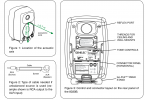Let me clarify a couple of things. I already purchased Genelec 8030s and they are on their way. The only input they have is XLR and I will be hooking them up to my AVR as surrounds (mains are the same and work fantastic). As per the Genelec manual, the RCA signal should be wired to pin 2 of the XLR which is what I see in Monoprice's cables.
View attachment 265731
I will have my 2nd subwooder close to one of the surrounds (and for that I also am considering a 12 meter RCA-RCA cable), and since the surrounds and sub are active, naturally, they will be close to outlets. Voltage is standard 220V for Europe.

